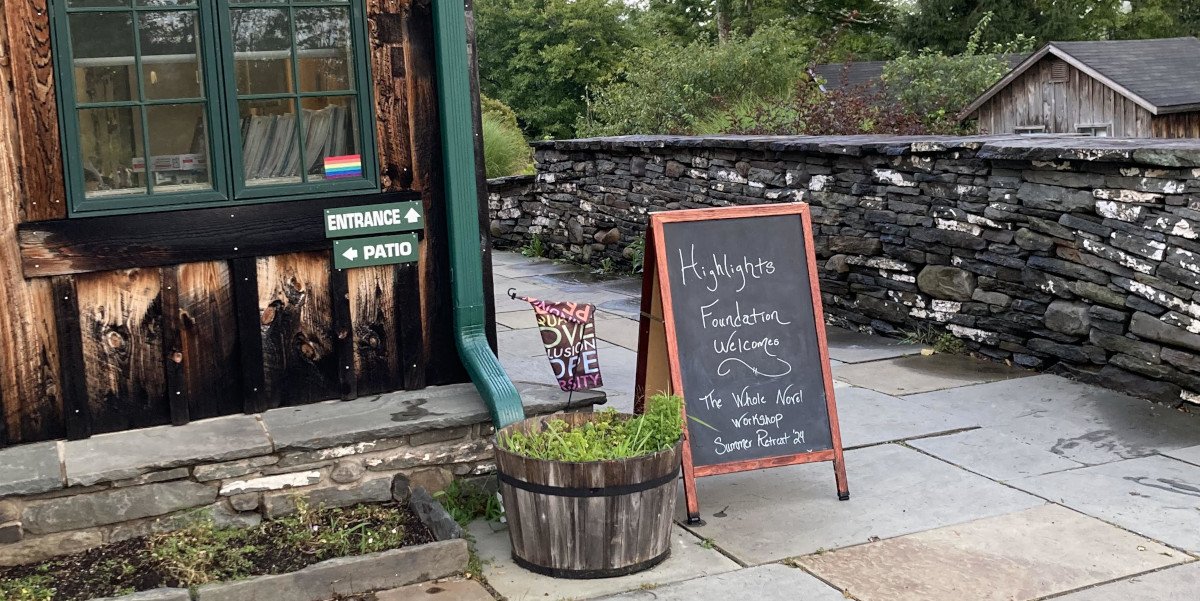Takeaways from My Experience at the Highlights Whole Novel Workshop
The Barn at Highlights is the center of group activities and where the marvelous food is served.
TLDR (Too long, didn’t read): Investing in my own growth as a writer is always worth it.
The joy of eating someone else’s cooking
I don’t know about you, but I don’t particularly enjoy cooking. I do, however, enjoy eating good food, so it was a delight to eat food that was fresh, locally sourced, and lovingly prepared—and that required no thought or input from me.
Each meal was served buffet style, and every evening the chef came out and told us about the food she and her staff had prepared. Pennsylvania peaches were in season while I was there, and they were delicious. Dessert was served every night and cookies with lunch every day. Lots of hot tea choices, soft drinks, and snacks were available all day. And an ice cream freezer! I tried a nutty chocolate bar.
A quiet place to sleep and lots of room to roam
A view of the Lodge, one of the housing options.
I stayed at the Lodge, which is the Highlights Foundation’s mini-hotel, with about 8 rooms. It includes a large, comfortable common room, a kitchenette with snacks, and a covered porch with rocking chairs.
Each room has twin beds, a small writing desk, a little bookcase with kid books, a private bathroom, and AC. There was reliable WiFi too. No television.
The other options were a private cabin or a room at the Farmhouse. Since I live in the woods and don't interact with many people in my day-to-day life, I figured I'd try the Lodge. It turns out that's where half the faculty were also staying, including my faculty reader, Crystal Allen (MG novelist from Texas).
The Highlights Foundation is located in rural northeast Pennsylvania and has about 1300 acres with multiple walking trails and lots of wildlife.
A selfie at the creek after walking about 3 miles on Highlights trails through the woods.
A nice mix of activities on the daily schedule
After breakfast, we met in our 6-student “Brain Trust” groups with a faculty leader. We met 3 times during our stay and each writer had 45 minutes to lead a discussion about their work.
This was quite different from the traditional critique workshop where the writer is supposed to remain silent. The purpose of the Brain Trust was to brainstorm with the writer and answer whatever questions she brought to the group.
This process worked well. My group leader was Alicia D. Williams whose novel Genesis Begins Again is excellent contemporary MG.
After lunch, we had free time to write, nap, go for a walk, or whatever we chose. The time was ours.
I tended to write in my room. There are also lots of fun places around the campus to write, either by yourself or with someone nearby.
Each day at 4:30 there was an optional, one-hour community write-in, which I tried once. The peer pressure of others writing around me was something I definitely felt, but it was a little uncomfortable, so I didn't do it again.
After appetizers, drinks, and supper, programming resumed with a lecture/presentation or a panel discussion, led by one or more of the faculty. This usually lasted until about 9 or so, by which time I was really dragging.
Friendly and approachable faculty and fellow students
I’ve written earlier posts about the feedback from Crystal Allen, my faculty reader, before the workshop started (see “Tough Feedback” and “How to Decide”). In person, Crystal was delightful. One afternoon during the workshop, she and I brainstormed about my dog novel, which was super helpful. We talked more in depth about some of her written feedback and how I’m planning to revise. We also had a second, scheduled one-on-one after my Brain Trust session.
I also chatted with most of the other faculty members at meals. They were all very open and encouraged students to ask them anything. There were 9 faculty members and 18 students.
I got to know my fellow Brain Trust group members the best and we have exchanged contact info. Students included writers working on their first novels and writers who’ve already published novels.
My takeaways, both small and large
One writing prompt provided by Sarah Aronson during a community write-in session proved especially helpful. She said to make a list of all the primary and secondary characters in your novel and then identify each character’s want and fear.
I used that prompt to make a table with the characters in column one, their wants in column two, and their fears in column three. Seeing them all together like that—and expressing the wants and fears for the first time for several characters—made a light bulb blink on. This was an unexpected takeaway.
The biggest takeaway was that brainstorming with a smart writer who’d read my whole novel and had ideas about how it can be made better was a wonderful thing. I came away with concrete steps to implement on my revision and a sense that it is close. So empowering.
A big investment in my writing growth
Highlights was the most expensive program I’ve attended in many years, and it was so worth it. The novel that I’ve been working on for years has finally come into focus. I still have a few months (at least) of work to do on it, but I know what needs to be done. Hallelujah!


